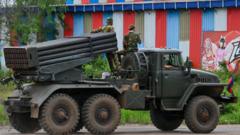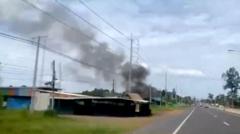Thailand and Cambodia agree to seek resolution as casualties mount and diplomatic tensions rise.
Thailand and Cambodia Set for Peace Talks in Malaysia Amid Ongoing Conflict

Thailand and Cambodia Set for Peace Talks in Malaysia Amid Ongoing Conflict
Negotiations to halt four days of fighting will take place after U.S. intervention emphasizes need for ceasefire.
Thailand and Cambodia have scheduled talks in Malaysia for Monday in a bid to resolve a four-day conflict that has escalated tensions between the neighboring nations. Acting Prime Minister Phumtham Wechayachai will lead the Thai delegation, following a direct appeal from U.S. President Donald Trump, who urged immediate cessation of hostilities during calls to both leaders over the weekend.
The agreement for talks comes as both countries face significant loss, with at least 33 soldiers and civilians reported dead, and thousands of individuals displaced due to border skirmishes that commenced on July 24. Trump, emphasizing the urgency of the situation, made it clear that no trade discussions, including the highly contentious 36% tariffs imposed on both countries, would proceed until a ceasefire is established.
During his time at his Scottish golf resort, Trump posted on social media, expressing hope for a swift peace agreement, stating that both nations are committed to discussing a ceasefire. While Cambodia has shown willingness to accept the terms for a halt in hostilities, Thailand has expressed a preference for dialogue to precede any formal ceasefire declaration.
The Thai government has acknowledged the U.S. president's concerns and reiterated its commitment to dialogue. Moreover, amidst ongoing artillery offensives, Cambodia stressed its acceptance of an immediate and unconditional ceasefire. Cambodian Prime Minister Hun Manet conveyed to Trump that this mediation could effectively safeguard military personnel and civilians caught in the crossfire.
The friction between Thailand and Cambodia has deeper roots, with accusations flying from both sides regarding the initiation of combat. Thailand contends that drone reconnaissance by Cambodian forces instigated the recent clashes, while Cambodia argues that Thailand violated agreements by advancing near sensitive landmarks, such as the Khmer-Hindu temple.
Despite the complexity of the situation, both nations have indicated a desire for a peaceful resolution. Malaysian Prime Minister Anwar Ibrahim has previously extended offers to mediate, balancing the delicate diplomatic exchanges amid rising tensions and impending economic sanctions.
As the situation evolves, Trump has expressed anticipation to re-engage in trade talks once the conflict subsides, marking a pivotal moment for both Thailand and Cambodia under the specter of international intervention.


















